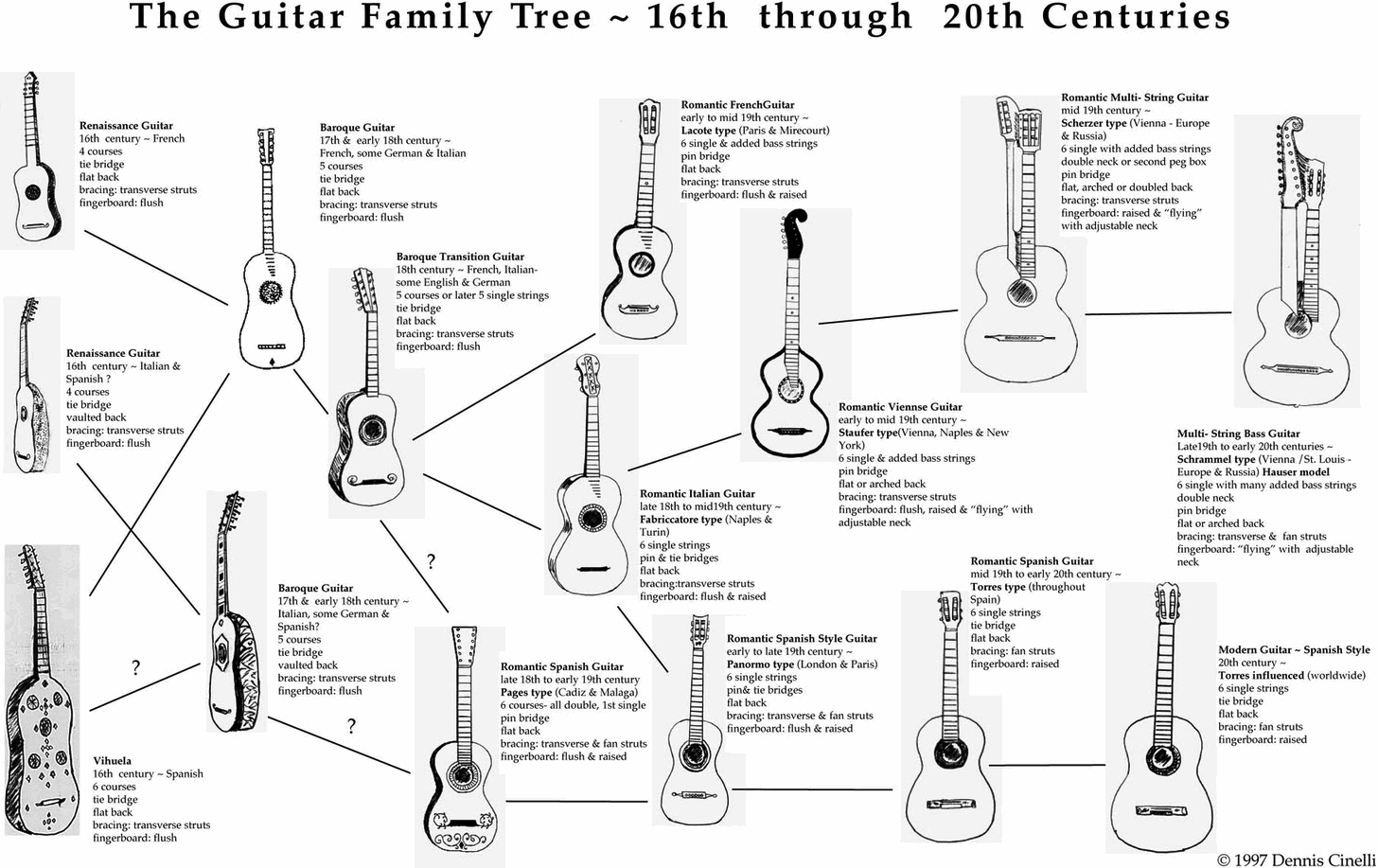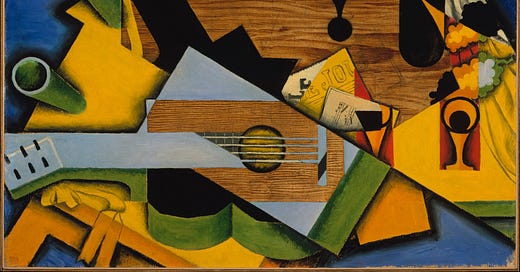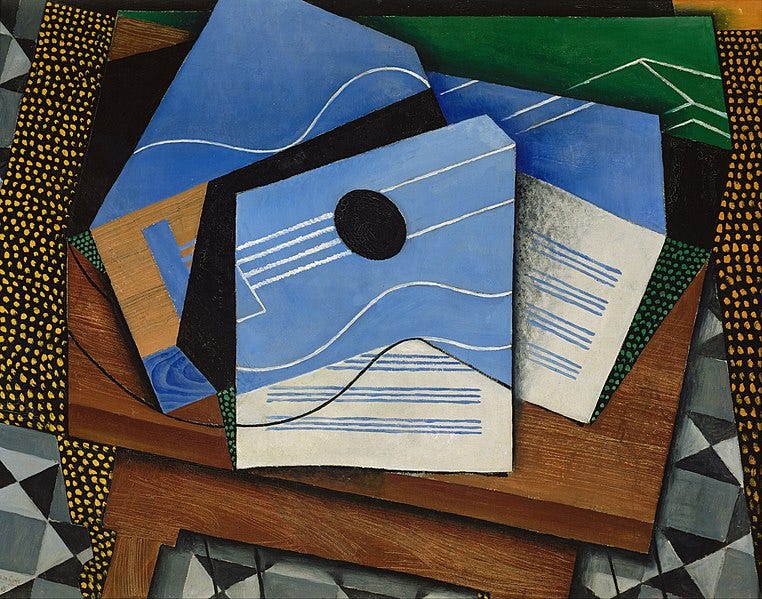These past few weeks I’ve compiling a list of all technologies. Yes, all of them. My goal, like I wrote about a few weeks ago, is to build a plausible initial version of the complete historical tech tree, including all connections between technologies — prerequisites, improvements, inspirations, and so on. This has somehow never been done before, as although it recently transpired that friend-of-the-blog Rohit, at Strange Loop Canon, published a list of all technologies just as I was in the middle of building mine.1 Perhaps this indicates that the time is ripe for such a project.
I’ll reveal the result soon enough, when I have a satisfactory v1. In the meantime, I want to discuss a practical question I encountered, which is this: What counts as a technology to be included in the tree?
Most of us have an intuitive understanding of what tech is, but defining it precisely is, as with most definitions, tricky. There are corner cases.
Consider the following list:
A guitar
An electric guitar
A guitar amplifier
The idea of electronic amplification
Strings made of nylon
Nylon
Rock music
The piece ‘Stairway to Heaven’
Jimmy Page’s Gibson EDS-1275 double-necked guitar
Specific musical techniques used by Jimmy Page to make certain sounds when playing ‘Stairway to Heaven’
Before writing this list, I already had #1, #2 and #6 in my tech tree database. At first I hesitated at including musical instruments at all — they seemed to be in a different class from things like clocks and computers. But then instruments are clearly technological in some sense: they’re complex machines that evolved through tinkering and integration of other technologies to achieve a purpose. Pipe organs were, together with mechanical clocks, the highest technological achievements of the European Middle Ages. Synthesizers were among the first applications of electronic computers other than computing itself. The modern guitar, a Spanish invention descending from various older instruments like the oud and lute, is perhaps simpler than organs and synthesizers, but it’s clearly not trivial either. And the electric guitar seems highly technological with its dependence on electric and electronic technology.

Item #6, nylon, is clearly a technological invention. Technologies include human-made materials. The process of inventing nylon is also a textbook example of industrial research and development: it was the result of a research program by the chemical company DuPont on artificial textiles in the 1920s and 30s.
I realized upon writing the list that #4, electronic amplification, was missing from my tree, yet totally deserved a spot. In fact, the amplifier was the immediate consequence of the crucial development of the triode vacuum tube in 1906, and can be considered one of the major inventions of the 20th century, since it allowed long-distance communication and therefore radio, television, the internet, etc.
The guitar amplifier (#3) is a direct descendant of the electronic amplifier, and nylon strings (#5) are a direct descendant of nylon. They’re clearly technologies, but I think they’re too fine-grained for a general-purpose tree of all human inventions. They would, however, be highly relevant in a detailed diagram of guitar or musical instrument evolution, like the one above but with more complexity.
The last four items are where things get interesting. #7 is a genre of music. Are things like ‘rock’ or ‘jazz’ technologies? Intuitively, most of us would probably say no, but they do have some features that are associated with tech. Genres are invented. They can spread and be adopted, and they can provide a framework for further innovations, including new genres but also techniques, musical patterns, instruments, etc. Also, the concept of genre or style can be applied to tech. “Pendulum clocks“ and “1980s Soviet computers” can be thought of as genres of clocks and computers respectively. Still, it feels somehow wrong to count ‘rock music’ as tech.
A specific piece of music, such as ‘Stairway to Heaven’(#8) by Led Zeppelin, surely cannot be considered technology. Right? But again, it had to be created through innovation, and it can enable further developments (cover versions, parodies, inspiration for other songs, etc.). The reasons it’s not tech are probably the same as the ones for music genres, with the additional consideration that ‘Stairway to Heaven’ is an instance of rock music.
I think it’s fair to say that technologies are abstract ideas. When they get instantiated into a real-life object, that object is a product of the tech, but not tech itself. Jimmy Page’s Gibson EDS-1275 double-necked guitar (#9), used in ‘Stairway to Heaven,’ is an instance of the electric guitar, and it combines together many technologies: every ancestor or prerequisite of electric guitars, like the classical Spanish guitar and the electronic amplifier, and also components like strings, materials, even the double-neck design, etc. But in itself, it’s not a technology, at least not one that would belong in a tech tree.
Lastly, #10 represents whatever musical techniques, patterns, ideas, etc. used when composing or playing ‘Stairway to Heaven.’ Or any piece of music. This paragraph would probably be more interesting if I knew how to play the guitar. I should have picked an example about writing. Anyway, the point is that a piece of music, or art, or writing supposes the use of many techniques that could be seen as technologies, since again they’re invented and lead to new developments and so on. The analogues for, say, building clocks or computers would most likely be tech. (Though too fine-grained for the big tree, except possibly for a handful of widely influential techniques.)
Generalizing beyond music, it seems clear that:
Technology is a species of abstract idea, or meme; and, like all ideas, technologies can be invented, spread, abandoned, or used to give birth to new ideas.
But ideas are a wider class than just technology. Anything that gets invented is not necessarily tech.
Art forms aren’t usually thought of as technology, whether they’re genres and styles, or specific instances of those, like music pieces, books, poems, paintings, etc.
However, technology can totally be involved in enabling art forms: musical instruments, pigments used for paint, writing implements like pencils are all technologies. Possibly techniques used to make art, too, though those are borderline.
There are other things that work like art in this respect: food, games, philosophical ideas. Tools for cooking, and certain cooking techniques, can be considered tech; but a specific recipe isn’t, and neither is an instance of the recipe: a dish.
So what exactly separate tech ideas from non-tech ideas?
One answer would be that tech is science-based. This reduces the problem to defining science, which isn’t necessarily easy. It can’t be the scientific method: technology is far older than the 16th century. I actually do have an answer, which is that sciences are the fields of knowledge that don’t care about their classics: they’re the fields where only the most recent advances are considered truly valuable.
In this view, tech is whatever innovations use the most recent knowledge. Which, you know, tracks the way people actually use the word — we don’t often call pencils “technological,” since they’re not based on any recent science. Though of course they were, at the time of their invention.
But the truer answer is that tech has to be practical.2 It’s always used for some other purpose, not for its own sake. Sure, an engineer may enjoy working on developing new tech, but the goal is to enable something else entirely. For a guitar, the goal is to make music. For a clock, to keep time. For a computer, to compute things, or access a global communication network, or keep time, or make music.
By contrast, musical genres, and musical pieces, and books, poems, paintings, and recipes and dishes and games are not practical: they are done for their own sake.3 They can still spark other things — inspire new tech, allow someone to make a living4 — but they’re generally the end points of human effort. They’re the things we do because we want to.
The difference between tech and non-tech, therefore, is the difference between instrumental and terminal value. It might, of course, be worth making a tree of terminally-valued things. That task would, however, seem even more daunting than a tree of instrumentally-valued things. I think there might be vastly more terminally-valued things than instrumentally-valued ones — so I’m going to focus on the latter for now.
It’s fine — we’ve agreed to combine our data. Our approaches are also different enough that my thing is worth doing. The main difference is that I focus on links, while Rohit tries to see patterns by encoding which fields influenced and were influenced by each tech.
For what it’s worth, Wikipedia’s definition of tech is “Technology is the application of knowledge for achieving practical goals in a reproducible way“, taken from a 1993 book by Skolnikoff. I realized this just after I came to this similar conclusion.
What about philosophical ideas? I think they fall in either bin depending on the specifics. Some philosophy is deeply practical, and some other philosophy absolutely isn’t.
Generally they enable things of their own category, though, and that might be another useful distinction with tech. An advance in electronics can directly cause new innovations in music, but an advance in music rarely causes progress in electronics, except indirectly.









“...are not practical: they are done for their own sake.”
Very much disagree. I study art history, and the great majority of what we call artworks have instrumental value. They communicate with the divine, display power, and express ideas. They enable experiences and understanding that cannot be accessed through other means.
Think about architecture. Clearly a technology, right? Some of the most famous buildings (Hagia Sophia, the Guggenheim Bilbao) were built at the cutting edge of technology. But they also create the same kind of aesthetic experiences that food and music create. And not incidentally: that’s their point. So are they a technology or not?
Song works the same way. We know that ancient song served as a way of structuring lyrics so they could be memorized and repeated. It made possible certain kinds of communication that were not otherwise possible. Isn’t that a technology?
The ultimate issue with tech trees, why none has been completed before, is hinted at here but not really described fully. When it comes down to it, the oldest and most potent technologies we have are social technologies. Jimmy Page could never have learned guitar, let alone written songs without a society to support him.
This concession opens a rabbit hole of massive proportions to tumble down. All of human culture and society - marriage, friendship, trade, war, et cetera are ultimately technologies, even by your definition here. Marriage helps keep young men tamed and prevents revolts. Friendships allow for the overcoming of zero-sum competition and promotes greater flourishing in the long run. Hopefully I don't have to explain trade or war.
Either way, all of these things are instrumentally valuable. If you truly do want to create a 'tech tree' that deserves the name, you'll have to include social technologies as well, as far as I'm concerned.